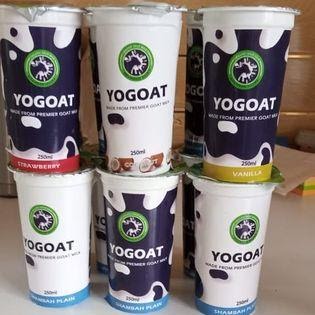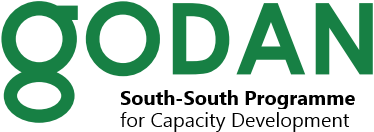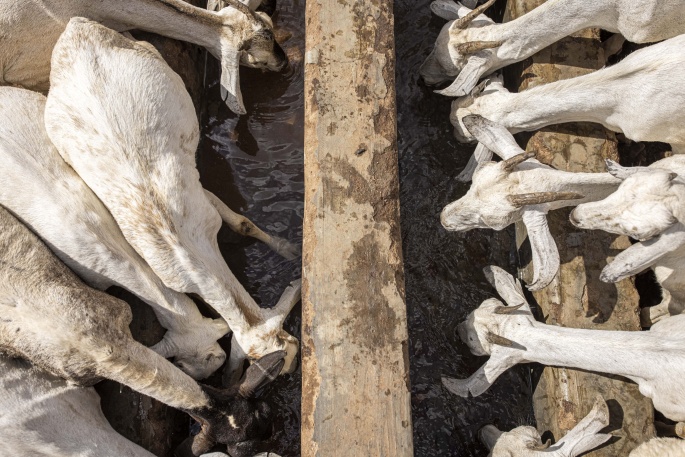GODAN Programme for Capacity Development (GP4CD) is a non profit organisation that works to support and promote the creation and implementation of open data platforms and adoption of technology and tools towards agriculture growth and transformation in the South to South in line with the GODAN Nairobi Declaration, that was signed by Ministers from 15 African countries, on 17June 17, 2017.
P4CDA works directly with farmers and farmer associations, academia, government, and private stakeholders in the agriculture sector identifying gaps and meeting the capacity needs in the ecosystem towards the achievement of food and nutrition security in communities.
P4CDA works through its established FarmHubs to empower youth and women at the household level to provide extension and value addition services to respective farmers. The knowledge shared is sourced from open data platforms such as AGROVOC. The platform serves as a one stop shop, providing knowledge and links to information needed for reference.
GODAN Programme for Capacity Development (GP4CD)FarmHubs are equipped with computers and internet connectivity. Youth and Women in each community go through a digital literacy programme, Transformation Action Learning System (TALS) inclusive of Data Science and GIS curriculum content which helps in the sourcing of data for experiential learning.
P4CDA has been creating working groups of farmers as per farming practices e.g. livestock and crops, assigning trained youths in sourcing of respective data and information and adoption of needed technological tools for transformation and growth.
AGROVOC and GODAN Programme for Capacity Development (GP4CD)
Dairy Goat Farming working group was the initial project. Information on dairy goat farming was sourced from AGROVOC and repositories from a link to AGRIS, for experiential learning. Initial learning was on goat breeds, goat feeds, goat houses and goat diseases. This led to research on maximised production based on animal husbandry and creation of a technology platform for traceability. It was found that inbreeding was the key cause of poor milk production. The platform therefore enabled the creation of a benchmark for maximised quality goat milk production. Insemination was therefore controlled. Bucks, does and offsprings were separated as needed.
Information sourced from AGROVOC advised a goat house design for controlled husbandry, feeding, safety and harvesting of manure for production of biofuel and use in the growing of goat feeds such as lucerne, clover and other protein and energy giving crops, as seen in the photos below:

AGROVOC platform also provided information on goat milk value added products such as goat milk yoghurt, goat cheese and goat milk soap. A dairy goat working group successfully explored making goat milk yogurt, in 5 flavours (plain, vanilla, Pina Colada, chocolate and strawberry), which they branded as ‘YOGOAT’ and was made available to the market; . The working group is currently working on producing goat cheese and goat milk soap.

The second GODAN Programme for Capacity Development (GP4CD) working group project capitalising on AGROVOC for reference is the Crop Production working group. Their focus has been on maximising crop yields through soil profiling. The majority of farmers and farm owners in Africa are small scale farmers aged 65+ who still practice traditional farming exacerbated by lack of government appointed extension service officers. Lack of knowledge has led to farmers practicing farming with little regard to the deteriorating quality of soil over time. It is estimated that 37% of the farmers live on degraded soil farms with a steady 9:2 tonnage decline of produce per hectare. Their use of fertiliser and pesticides has also been erroneous due to instructions on packages provided in a language foreign to many of them. In 2018, Kenya imported over 17 308 tonnes of pesticides. This figure had quadrupled from 2015 (RTFI). According to a study done by Jameel Poverty Action Lab in Western Kenya only 24 percent of farmers report being aware of the correct dosage of fertilizer to use to maximize profits.
A survey conducted by Cropnuts Kenya showed that with the correct soil data and continuous crop monitoring, farmers can reduce fertilizer and pesticide costs by 63% and increase yields by up to 77%. Lack of affordable, comprehensive soil data collecting tools led the GODAN Programme for Capacity Development (GP4CD) Crop Production working group in developing and promoting, among farmers, the adoption of their affordable and comprehensive technological platform, ShambaAssistant, that collects soil data for remote analysis with a SMS, USSD and Call feedback mechanism in indigenous language.
ShambaAssistant was created with a wifi and GPRS capability, inbuilt camera, solar charging panel and internal storage to enable the continuous collection of soil humidity, soil PH, nitrogen content, potassium content, phosphorus content, soil electrical conductivity, air humidity, air temperature and crop images. The information collected is transmitted to the cloud where crop health analysis is done and advisory information is sent to a farmer via USSD, SMS or a call.
The design and use of ShambaAssistant was also advised by 119% penetration of mobile phones in Kenya with 74% of the 40% with access to the internet accessing through their mobile phones. ShambaAssistant geotagging capability provides visibility needed for precise advisory and monitoring of a farm ensuring data integrity and enhancing its security through Radio Frequency Identification tags. Its simple features as a handheld IOT device with audio and visual alerts provide a short learning curve in its use, hence no need for skilled labour in its operation.
As evidenced, AGROVOC has continued to provide knowledge needed by the different working groups in GODAN Programme for Capacity Development (GP4CD), resulting in market viable products and social enterprises. There has been a consistent need to provide indigenous language interpretation of data, information sourced and technology platforms created, as can be seen in the following video, where one of the GODAN Programme for Capacity Development (GP4CD) technology team members, James Maina, explains the functionalities of a resulting platform in the Kikuyu language.

